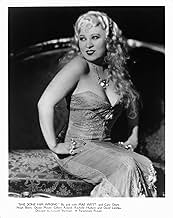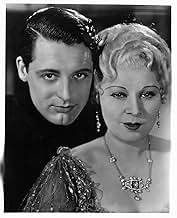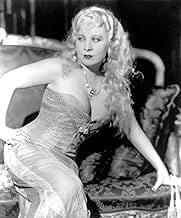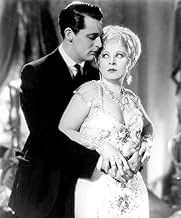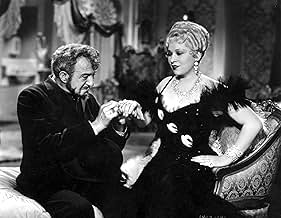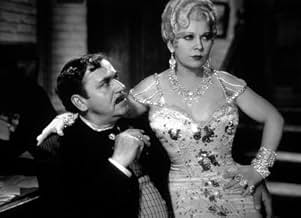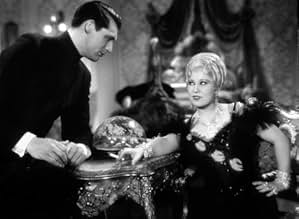VALUTAZIONE IMDb
6,3/10
7457
LA TUA VALUTAZIONE
Aggiungi una trama nella tua linguaIn the Gay Nineties, a seductive nightclub singer contends with several suitors, including a jealous escaped convict and a handsome temperance league member.In the Gay Nineties, a seductive nightclub singer contends with several suitors, including a jealous escaped convict and a handsome temperance league member.In the Gay Nineties, a seductive nightclub singer contends with several suitors, including a jealous escaped convict and a handsome temperance league member.
- Candidato a 1 Oscar
- 5 vittorie e 1 candidatura in totale
Noah Beery
- Gus Jordan
- (as Noah Beery Sr.)
Robert Homans
- Doheney
- (as Robert E. Homans)
Ernie Adams
- Man in Audience
- (non citato nei titoli originali)
Billy Bletcher
- Singing Waiter
- (non citato nei titoli originali)
Wade Boteler
- Dan's Pal
- (non citato nei titoli originali)
Jack Carr
- Patron Who Hits His Girl
- (non citato nei titoli originali)
Recensioni in evidenza
It's really a privilege to be able to see an icon like Mae West on film. This early talkie is Mae at her best - precode, dripping in diamonds and one-liners. It's a shame that later in life, she became a parody of herself. She was an important figure not only in theater but in early film.
Mae was not only a talented performer, she was a gifted writer and knew how to showcase herself. Though "She Done Him Wrong" is light on plot, it's heavy on Mae, and frankly, who cares about anything else? She's Lady Lou, a bawdy singer, with her hourglass figure shown to great advantage in a variety of gowns. All men want her - and let's face it, many men have had her! When she visits her ex-boyfriend in jail, she knows ever other con in the place.
This is a fascinating movie on so many levels. Besides Mae and her precode innuendos, it has Cary Grant's star-making performance (though Grant always disliked West's claim that she discovered him). It's the film that saved Paramount from bankruptcy. It's one of the films that brought on the code. Most interesting to me is, the audiences loved it! These audiences would very soon (like the next year) be deprived of the sexual double entendre and morality found in this film. Rather than the early audiences being naive and unsophisticated, it was the banning of certain language and situations in film that gave rise to the idea of a false world: that once, there were no shades of gray, all unmarried women were virgins, the bad guy always lost, and no bad deed goes unpunished.
"She Done Him Wrong" is a great chance to see a very young and handsome Gilbert Roland and Noah Berry Sr. (whose son really resembled him) in early film roles.
An amazing artifact, some hilarious lines, and most of all - Mae.
Mae was not only a talented performer, she was a gifted writer and knew how to showcase herself. Though "She Done Him Wrong" is light on plot, it's heavy on Mae, and frankly, who cares about anything else? She's Lady Lou, a bawdy singer, with her hourglass figure shown to great advantage in a variety of gowns. All men want her - and let's face it, many men have had her! When she visits her ex-boyfriend in jail, she knows ever other con in the place.
This is a fascinating movie on so many levels. Besides Mae and her precode innuendos, it has Cary Grant's star-making performance (though Grant always disliked West's claim that she discovered him). It's the film that saved Paramount from bankruptcy. It's one of the films that brought on the code. Most interesting to me is, the audiences loved it! These audiences would very soon (like the next year) be deprived of the sexual double entendre and morality found in this film. Rather than the early audiences being naive and unsophisticated, it was the banning of certain language and situations in film that gave rise to the idea of a false world: that once, there were no shades of gray, all unmarried women were virgins, the bad guy always lost, and no bad deed goes unpunished.
"She Done Him Wrong" is a great chance to see a very young and handsome Gilbert Roland and Noah Berry Sr. (whose son really resembled him) in early film roles.
An amazing artifact, some hilarious lines, and most of all - Mae.
Mae West was a veteran of burlesque, vaudeville and the Broadway stage by the time she made her first film in 1932 at the age of 39. `She Done Him Wrong' was her second film and her first starring role in an adaptation of her smash Broadway hit `Diamond Lil'. It was a play that West had written herself and it played to packed houses on Broadway for years. This film was nominated for an Academy Award for best picture and made Cary Grant into an instant star. Mae went on to write nine of the fourteen screenplays for films in which she was to star. Thus, all those great quotes we've heard that are attributed to her were not only said by her, but written by her as well. By 1935, she was the most highly paid woman in America. To this day, she remains one of the female stars most often imitated by female impersonators.
This film is among her best. It is full of the bawdy double entendre that became her trademark. She was the queen of sexual innuendo and suggestive dialogue and many of her lines have become part of Americana (e.g. `Is that a gun in your pocket or are you just glad to see me?' And, `A hard man is good to find.' And of course, `Come up and see me sometime.')
The plot of this film is simplistic and it is clearly a vehicle for her enormous talent, leading up to the now famous proposal by Cary Grant at the end of the film. Mae commands every frame of the film with her incomparable combination of sex appeal and ribald humor. Her sense of comic timing is impeccable making the funny lines she writes that much more hilarious by the snide way in which she delivers them.
Before this film, Cary Grant had appeared in half a dozen films and was building a reputation as a solid actor. However, none of his early films gave him the exposure that this film did due to its wild popularity at the time. West handpicked him for the part saying that he combined virility with the bearing of a gentleman. She wanted someone who would epitomize the now famous line, `Hello, warm, dark and handsome.' Though his role in this film is minor compared to West's, it made him a household name and a bankable star.
This classic film is a piece of film history that shouldn't be missed. I rated it a 10/10. It is among Mae West's best moments. I highly recommend it.
This film is among her best. It is full of the bawdy double entendre that became her trademark. She was the queen of sexual innuendo and suggestive dialogue and many of her lines have become part of Americana (e.g. `Is that a gun in your pocket or are you just glad to see me?' And, `A hard man is good to find.' And of course, `Come up and see me sometime.')
The plot of this film is simplistic and it is clearly a vehicle for her enormous talent, leading up to the now famous proposal by Cary Grant at the end of the film. Mae commands every frame of the film with her incomparable combination of sex appeal and ribald humor. Her sense of comic timing is impeccable making the funny lines she writes that much more hilarious by the snide way in which she delivers them.
Before this film, Cary Grant had appeared in half a dozen films and was building a reputation as a solid actor. However, none of his early films gave him the exposure that this film did due to its wild popularity at the time. West handpicked him for the part saying that he combined virility with the bearing of a gentleman. She wanted someone who would epitomize the now famous line, `Hello, warm, dark and handsome.' Though his role in this film is minor compared to West's, it made him a household name and a bankable star.
This classic film is a piece of film history that shouldn't be missed. I rated it a 10/10. It is among Mae West's best moments. I highly recommend it.
After a supporting role in the George Raft film Night After Night, Paramount films realized what a gold mine they had in Mae West. Between her and a young radio singer named Bing Crosby, they pulled Paramount from the brink of bankruptcy, the white mountain studio nearly went under in the early Thirties.
After this the studio gave Mae her head in choosing material and she decided to use one of her own original plays, She Done Him Wrong. The story is set in the Bowery district of the 1890s and New York of the 1890s is where Mae grew up, she had a good ear and a good memory for character types she uses in the film.
Mae always plays Mae West and would you really want her as anyone else? She's a Bowery entertainer of the period, working in this case for Noah Beery's club as the main attraction. Beery's into some really shady business, he doubles in white slavery and nearly gets innocent Rochelle Hudson who tries to kill herself in his club. Mae saves her, but turns her over to Beery because she doesn't know about his other sideline. All she knows is that he pays off in diamonds as well as cash.
Besides Beery panting after her, we've got silent screen star Owen Moore, young Gilbert Roland who is the assistant to white slaver Rafaela Ottiana and in the film that would be his breakthrough, Cary Grant as a Salvation Army worker who's not all he seems. Mae personally picked Grant for his role, he was a young Paramount contract player beginning to get some notice. But as I said before in my review of I'm No Angel, this is not a Cary Grant film, this is a Mae West film.
Mae besides being one of the great sex symbols of the last century had a great memory and eye for detail of the bawdy Bowery of her youth. Good thing she came along before The Code was put in place. Her first films are her best, The Code definitely hampered her style.
And Mae West if she had anything, had style.
After this the studio gave Mae her head in choosing material and she decided to use one of her own original plays, She Done Him Wrong. The story is set in the Bowery district of the 1890s and New York of the 1890s is where Mae grew up, she had a good ear and a good memory for character types she uses in the film.
Mae always plays Mae West and would you really want her as anyone else? She's a Bowery entertainer of the period, working in this case for Noah Beery's club as the main attraction. Beery's into some really shady business, he doubles in white slavery and nearly gets innocent Rochelle Hudson who tries to kill herself in his club. Mae saves her, but turns her over to Beery because she doesn't know about his other sideline. All she knows is that he pays off in diamonds as well as cash.
Besides Beery panting after her, we've got silent screen star Owen Moore, young Gilbert Roland who is the assistant to white slaver Rafaela Ottiana and in the film that would be his breakthrough, Cary Grant as a Salvation Army worker who's not all he seems. Mae personally picked Grant for his role, he was a young Paramount contract player beginning to get some notice. But as I said before in my review of I'm No Angel, this is not a Cary Grant film, this is a Mae West film.
Mae besides being one of the great sex symbols of the last century had a great memory and eye for detail of the bawdy Bowery of her youth. Good thing she came along before The Code was put in place. Her first films are her best, The Code definitely hampered her style.
And Mae West if she had anything, had style.
Although this really cannot be classified as a musical, it is a classic example of Mae West at her suggestive musical best and what movie audiences thought was naughty in 1933. West costars with the extraordinary Cary Grant and sings three noteworthy songs: "I Wonder Where My Easy Rider's Gone," "A Guy What Takes His Time," and "Frankie and Johnny." --from Musicals on the Silver Screen, American Library Association, 2013
Mae West is certainly entertaining with her wisecracks and sexual innuendo. Unfortunately, she's the only entertaining thing about this whole film. The other actors, even a young Cary Grant, aren't given terribly interesting characters to inhabit. The whole thing is set-bound and the story is nonsense.
Okay, maybe not nonsense, but it is cluttered with too many subplots and one-note characters which fail to hold interest. The first ten minutes are a pain to sit through, mainly because West isn't there to enliven the proceedings. That should not be.
She Done Him Wrong (1933) is an interesting curio and a showcase for Mae West, but as entertainment, it is lacking.
Okay, maybe not nonsense, but it is cluttered with too many subplots and one-note characters which fail to hold interest. The first ten minutes are a pain to sit through, mainly because West isn't there to enliven the proceedings. That should not be.
She Done Him Wrong (1933) is an interesting curio and a showcase for Mae West, but as entertainment, it is lacking.
Lo sapevi?
- BlooperShadow of camera moves against the back wall of Lady Lou's apartment while she and Sally are talking.
- Versioni alternativeMaryland, Massachusetts, New York, Ohio, and Pennsylvania removed the song "A Guy What Takes His Time". Will H. Hays and Adolph Zukor went to New York to edit the song to an entrance by Mae West, one opening verse, and one closing verse to lessen the suggestiveness. Despite this, Ohio and Pennsylvania cut all of West's one liners.
- ConnessioniFeatured in The Twentieth Century: The Movies Learn to Talk (1959)
I più visti
Accedi per valutare e creare un elenco di titoli salvati per ottenere consigli personalizzati
- How long is She Done Him Wrong?Powered by Alexa
Dettagli
- Data di uscita
- Paese di origine
- Lingua
- Celebre anche come
- Nació para pecar
- Luoghi delle riprese
- Azienda produttrice
- Vedi altri crediti dell’azienda su IMDbPro
Botteghino
- Budget
- 200.000 USD (previsto)
- Tempo di esecuzione
- 1h 6min(66 min)
- Colore
- Proporzioni
- 1.37 : 1
Contribuisci a questa pagina
Suggerisci una modifica o aggiungi i contenuti mancanti


